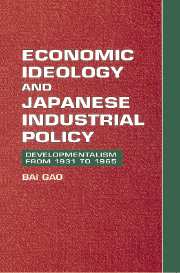Book contents
- Frontmatter
- Contents
- Acknowledgments
- List of abbreviations
- Note on Japanese usage
- 1 Introduction
- 2 The Ideology of Japanese developmentalism
- 3 The managed economy
- 4 Priority production
- 5 Promoting exports
- 6 High growth and liberalization
- 7 The institutional environment of economic reasoning
- Epilogue: Japanese developmentalism in historical perspective
- References in English
- References in Japanese
- Index
7 - The institutional environment of economic reasoning
Published online by Cambridge University Press: 29 March 2010
- Frontmatter
- Contents
- Acknowledgments
- List of abbreviations
- Note on Japanese usage
- 1 Introduction
- 2 The Ideology of Japanese developmentalism
- 3 The managed economy
- 4 Priority production
- 5 Promoting exports
- 6 High growth and liberalization
- 7 The institutional environment of economic reasoning
- Epilogue: Japanese developmentalism in historical perspective
- References in English
- References in Japanese
- Index
Summary
I began my analysis by showing the static characteristics of Japanese developmentalism, which emerged in 1931–45 and was developed further in the postwar period. After examining the dynamic process by which this ideology shaped three paradigms of Japanese industrial policy, I am convinced that Japanese developmentalism was a product of special historical circumstances. The constantly perceived international threats, either of total war with other nation-states or of external pressure to liberalize trade and capital investment, often set the policy agenda. Cross-national learning had been the major source of new economic ideas. Because of the traditional ties between Japan and Europe, especially Germany, in the prewar period, these ideas often came from Europe rather than the United States. To influence policy, economic ideas had to confront three different factors. First, the nationalist ideology that emerged in response to the perceived external threats often rejected the lower-level unit of analysis in the policy debates while providing legitimacy and generating public support for economic nationalism. Second, the structure of the state and state–business relations strongly influenced the means chosen to implement the new policy paradigm because the means directly redefined and influenced interest. Third, in this process, the strong link between economists and leading politicians often helped ideas to gain political power. In this chapter, I discuss further the significance of the Japanese case for our understanding of several theoretical issues.
The world system, nationalism, and Japanese developmentalism
In contrast to explanations that emphasize domestic sources of economic development in Japan, this book portrays the emergence of modern Japanese industrial policy in relation to the international environment.
- Type
- Chapter
- Information
- Economic Ideology and Japanese Industrial PolicyDevelopmentalism from 1931 to 1965, pp. 280 - 298Publisher: Cambridge University PressPrint publication year: 1997



